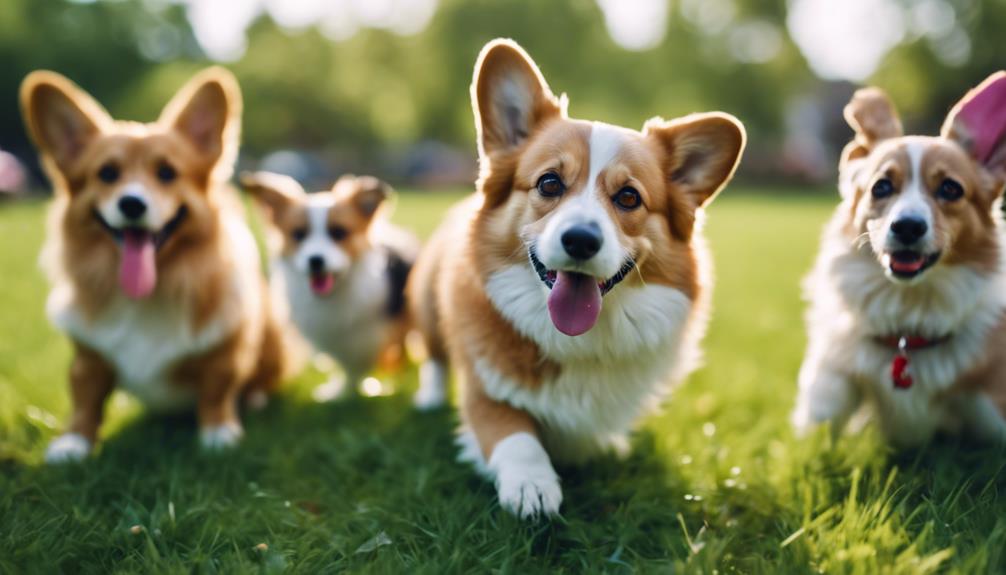Corgis exhibit a distinct propensity for thriving in social settings, largely attributed to their friendly disposition and inherent curiosity. This breed's playful nature not only fosters interactions among peers but also cultivates meaningful connections with humans. As they engage in social activities, Corgis develop vital skills that contribute to their emotional resilience and adaptability. However, the nuances of their communication styles and the specific benefits derived from these social experiences warrant further exploration to fully understand the depth of their sociability. What factors truly enhance their ability to flourish in diverse environments?
Corgis' Friendly Nature

Corgis are renowned for their amiable disposition, making them exceptionally well-suited for social interactions with both humans and other animals.
Their personality traits, such as friendliness, intelligence, and enthusiasm, contribute significantly to their appeal as companions. Corgis thrive on canine companionship, often forming strong bonds with their families and other pets. This breed exhibits a natural curiosity, which fosters a desire to explore and engage in social activities.
Key personality traits include:
- Affectionate: Corgis enjoy being close to their humans.
- Playful: They love to participate in games and activities.
These traits make Corgis not only delightful pets but also excellent social partners.
Playful Interaction With Peers
Engaging in playful interactions with their peers, Corgis showcase their vibrant energy and social skills, often leading to joyful experiences for both themselves and their companions.
Corgi playdates and group activities are essential for their emotional well-being and development. During these interactions, Corgis exhibit their natural instincts to chase, wrestle, and engage in friendly competition, fostering bonds with other dogs.
These social gatherings help build confidence, improve communication skills, and promote healthy physical activity. Additionally, Corgis learn valuable lessons in sharing, patience, and social etiquette.
Communication Styles of Corgis

Understanding the communication styles of Corgis is essential for fostering effective interactions and enhancing the bond between these dogs and their human companions.
Corgis utilize a combination of vocal expressions and body language to convey their feelings and desires. Their vocalizations include barks, whines, and howls, each indicating different emotions such as excitement, anxiety, or a need for attention.
Additionally, Corgis exhibit body language through tail wagging, ear positioning, and facial expressions. For example, a wagging tail often signifies happiness, while raised ears indicate alertness.
Recognizing these signals helps owners respond appropriately, ensuring a harmonious relationship.
Adaptability in Social Environments
Many Corgis exhibit remarkable adaptability in various social environments, allowing them to thrive in diverse situations and interactions. This environmental adaptability is evident as they seamlessly adjust to new people, pets, and settings. Their innate social resilience helps them overcome challenges, such as unfamiliar noises or busy gatherings. Corgis are often friendly and curious, which encourages positive interactions with others.
Key factors contributing to their adaptability include:
- Positive reinforcement: Corgis respond well to training, which enhances their ability to navigate social settings.
- Observational learning: They learn from the behavior of other dogs and humans, further improving their social skills.
This combination of traits fosters a harmonious social experience for both Corgis and their companions.
Benefits of Socialization for Corgis

Socialization offers numerous benefits for Corgis, enhancing their adaptability and overall well-being in various social settings.
Engaging with other dogs and people helps promote healthy behavioral development, allowing Corgis to learn essential social cues and interactions. This exposure reduces anxiety and fear, leading to more confident and well-adjusted pets.
Additionally, the health benefits of socialization are significant; regular interaction encourages physical activity, which is crucial for maintaining a healthy weight and preventing obesity-related issues.
Furthermore, socialized Corgis are less likely to develop behavioral problems, such as aggression or excessive barking.

